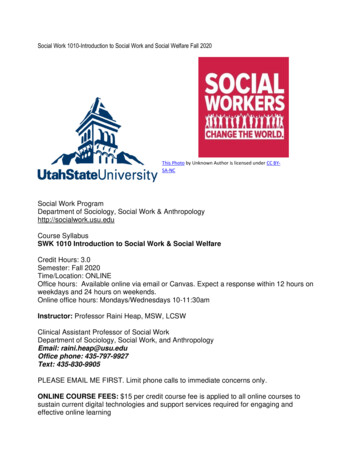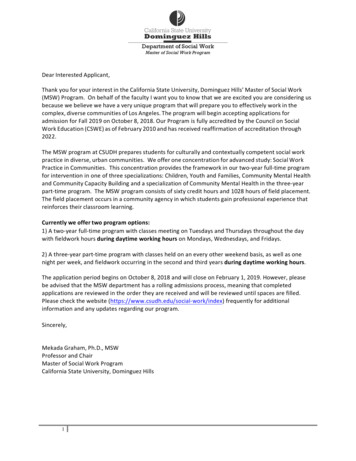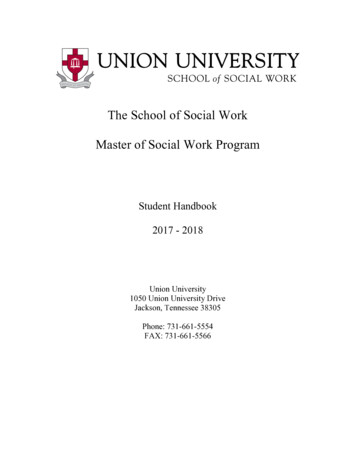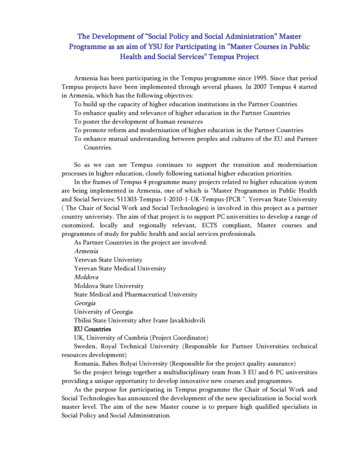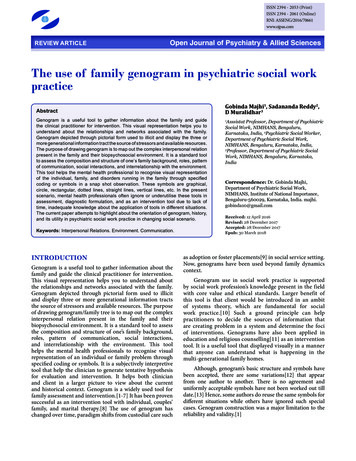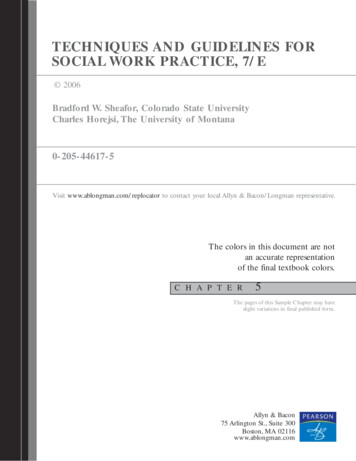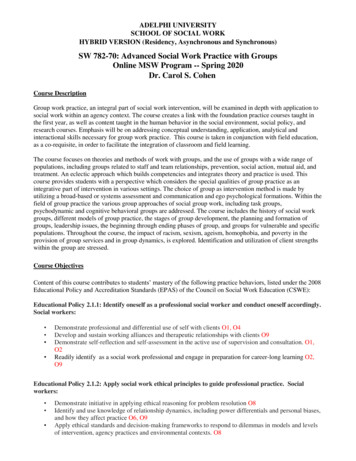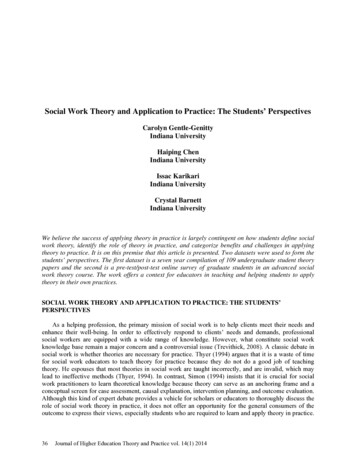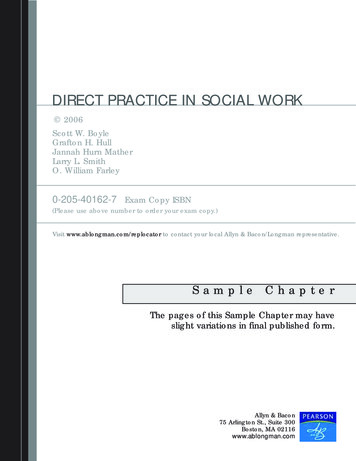
Transcription
DIRECT PRACTICE IN SOCIAL WORK 2006Scott W. BoyleGrafton H. HullJannah Hurn MatherLarry L. SmithO. William Farley0-205-40162-7 Exam Copy ISBN(Please use above number to order your exam copy.)Visit www.ablongman.com/replocator to contact your local Allyn & Bacon/Longman representative.Sample ChapterThe pages of this Sample Chapter may haveslight variations in final published form.Allyn & Bacon75 Arlington St., Suite 300Boston, MA 02116www.ablongman.com
CH03.QXD12/22/20049:48 AMPage 67Chapter 3Values, Ethics, and Ethical Dilemmas “When I see Tone again, I’m going to pop acap in his head.” The words came out from hisclient’s mouth with such vehemence that Masoudwas shocked and more than a little perplexed. “Ican see that you are very angry with Tone, butwhy do you want to buy him a cap?” he responded, trying to understand his client’s anger.The client rolled his eyes and said, “He’s the reason I spent two years in the slammer and I ain’tforgiving or forgetting. Now he’s sleeping withmy ex-wife. I should do both of them.”This was Masoud’s third week on the job providing direct services to clients transitioning froma halfway house to full integration into the community. His client, having served his entire sentence, would be free at the end of the week.Masoud recognized that the client was harboringstrong feelings toward someone named Tone andperhaps his ex-wife as well. But he was not surewhether to try to talk to his client about theanger, remonstrate with him about the consequences of hurting someone, or just assume theclient was blowing off steam. He wanted to beempathetic and not push his values on a clientwhose language use was a bit confusing. At thesame time, he recognized that the client’s angerhad been partly responsible for his previous incarceration. Because the client’s outburst came atthe end of their session, Masoud decided to talkto his supervisor about the situation and perhapsget some guidance. Although he did not knowwhat to do, he did recognize that he needed todo something.This case involves some of the most challenging aspects of social work practice, namelythe application of professional values andethics. One mark of a profession is the fact thatit is governed by an ethical code that affectsevery decision we make. This chapter addresses several topics including the roles ofpersonal and professional values, critical socialwork values that underlie the NASW Code ofEthics, and strategies for dealing with ethicaldilemmas.The Role of Valuesin Social WorkValues are, by definition, things that we consider good, positive, or important in our lives.For most people, values dictate the decisionswe make about our behavior and what we expect from other people. If individuals thinkthat acquiring money and consumer goods isimportant, that value will drive the actionsthey take in their daily lives. If others value relationships, this too will color the decisionsthey make every day.Everyone holds a set of values, yet thereare enormous differences among people withrespect to specific values. Value differences areevident in every area of our existence. Theyshow up in the world in the form of hatred andharm directed at others whose values are notthe same. They are reflected in decisions madeabout the activities or services on which
CH03.QXD12/22/20049:48 AMPage 6868 Part I: Introductiongovernments spend taxpayer money. If peoplevalue acquiring wealth above helping thosewith less, they will be reluctant to share theirresources. If we believe that social problems inthe United States such as poverty and illiteracyshould be given higher priority than spendingon foreign aid, we are reflecting a set of valuesabout the relative importance of these twocompeting issues. This leads us into a discussion of personal and professional values.Personal versus ProfessionalValuesCompeting values underlie political parties,differentiating, for example, Democrats fromRepublicans and conservatives from liberals. Itshould come as no surprise that all of ourclients will have values and that we ourselvespossess values. Social work, like many professions, recognizes that social workers have aright to their own values. The profession alsohas a set of values, and ethical standardsdrawn from those values, that circumscribehow social workers are expected to act. Theseprofessional values sometimes set limits on theextent to which social workers are free to exercise their personal values. This is a challengefor many individuals who are considering social work as a career. If you believe, for example, that life begins at conception, you willprobably have strong values about abortion. Ifyou believe that life begins at birth, this likelygives you a different set of values about abortion. If you value a woman’s right to controlher own body, you will likely have a differenttake on attempts by others to restrict women’sability to exercise that right.All of these differences in values can be interesting and help make us a diverse societyand world. However, the decision to become asocial worker places most of us in a position ofwww.ablongman.com/boyle1edeciding whether we can accept different values. We become acutely aware of this situationwhen clients have values that differ from ours.When a client seeks our help, we are expectedto make every effort to ensure that the assistance we provide is appropriate and effective.A client seeking help for an unplanned pregnancy should be able to expect that her socialworker will inform her about options, discusshonestly the advantages and disadvantages ofeach, and see that she gets the help she needs.Just as a client seeking help from a lawyer expects the attorney to defend him to the best ofhis ability, social work clients have a similarright to expect that we will do our very best tohelp them. If attorneys took the position that“I don’t like to defend anyone who might beguilty,” few of us would ever seek legal representation because we would distrust that person’s ability and willingness to help us.The pregnant client will not be served wellby a social worker who decides that she willoffer the client only one choice because shedoes not personally believe in the other alternatives. Again, it would be like an attorneywho, after hearing your situation, says, “Well,why don’t you consider pleading guilty?” Mostof us would feel, correctly, that the lawyer hasnot behaved professionally, because she has aduty to inform us about the options fromwhich we can choose. Likewise, if we seekmedical help for a problem, we would like thephysician to explain to us what our choicesare. We would be put off by a doctor who hasonly one solution: “You will need surgery tocure that infection.” In fact, we would likelyaccuse the person of malpractice because thedoctor failed to explain alternatives and therisks for each option.Social work clients have the same rights asothers to get the best care and service we canprovide. This means that we have a profes-
CH03.QXD12/22/20049:48 AMPage 69Chapter 3: Values, Ethics, and Ethical Dilemmas 69sional obligation to ensure that the services weprovide are complete, appropriate to theclient’s needs, and reflect the best informationcurrently available. The inability to meet thisstandard should be an indication that the social worker is unsuited for this profession. Although some prospective social workersrespond to this challenge with statements like,“Well, I’d just refer the client to another socialworker,” this is not always an option. In somecases, you may be the only social worker serving an area. In other situations, clients wouldneed to go through the entire process of explaining their situation to yet another socialworker, a step that causes needless delay andinconvenience.As you can see, it will be a challenge forsome social workers to fulfill their ethical obligation to clients when their personal valuesare different from those of the profession.Having to wrestle with these challenges is astandard component of social work educationand one that will confront the social worker atdifferent stages of his or her career.So far we have talked about social workvalues in the abstract without delineating whatthey are. In the following section, we lookspecifically at critical social work values thatundergird practice within this profession.Critical Social Work ValuesThe NASW Code of Ethics identifies six corevalues of the social work profession (NASW,1999). They include service, social justice, dignity and worth of the person, importance ofhuman relationships, integrity, and competence. These values are the basis for the ethicalprinciples underlying the ethical standardsincorporated in the code. We discuss each ofthe values and the ethical principle derivedfrom the value. Later in this chapter, weaddress each of the social worker’s ethicalresponsibilities.ServiceSocial workers believe that service to others isthe core value that characterizes the work ofthe entire profession. Service to others trumpsself-interest and is an obligation of all socialworkers. The ethical principle drawn from thisvalue is that “social workers’ primary goal isto help people in need and to address socialproblems.” Volunteering one’s time and energies without expectation of remuneration isalso consistent with this value.Social JusticeThe existence of vulnerable groups and populations at risk in society requires that socialworkers pursue social change activities designed to enhance economic and social justice.The ethical principle growing from this value isthat “social workers challenge social injustice”wherever it exists. Goals for social workers include recognition of the importance of culturaldiversity, equitable distribution of resources,and elimination of poverty and discrimination,among other social ills.Dignity and Worth of the PersonSocial workers believe in the inherent dignityand worth of every person and demonstratethis in the ways we treat other people. We acknowledge differences and diversity among individuals and groups and seek to ensure thatall people have the maximum opportunity todevelop their capacities. Social work valuesself-determination, the right of individuals tomake decisions about their lives, even when wedisagree with that decision. At the same time,social workers are responsible to both theclient and the larger society and are committed to resolution of conflicts between the two
CH03.QXD12/22/20049:48 AMPage 7070 Part I: Introductionsystems. The related ethical principle is that“social workers respect the inherent dignityand worth of the person.”www.ablongman.com/boyle1ethat “social workers practice within their areasof competence and develop and enhance theirprofessional expertise.”Importance of Human RelationshipsRelationships among people are important tosocial workers for several reasons. First, it isfrom these relationships that people acquirethe supports and strengths they need to succeed in life. Second, social work practice isbased on the premise of a helping relationshipbetween the client and the social worker. Onetenet of practice is that social workers work toenhance the well-being of people by supporting and strengthening human relationships.The ethical principle arising from this value isthat “social workers recognize the central importance of human relationships.”IntegrityIntegrity has to do with basic honesty. Socialworkers are expected to engage in ethical practice that honors their obligation to the clientand to their employer. The ethical principle devolving from this value is that “social workersbehave in a trustworthy manner.” A socialworker who fails to do so is violating a basictenet of the profession.CompetenceIt should come as no surprise that social workvalues competence in its practitioners. By thiswe mean that social workers have an obligation to acquire and maintain the highest levelof knowledge, skills, and values. Wheneverpossible, social workers should contributetheir wisdom in ways that further the knowledge base of the social work profession. Thiscan include evaluating one’s practice andsharing the results with colleagues throughconference presentations, workshops, andpublications. The related ethical principle isThe Social Work Code of EthicsFor purposes of this chapter, we look specifically at the Code of Ethics of the NationalAssociation of Social Workers. In doing so,we freely acknowledge the existence of othercodes of ethics, including the Canadian codeand those promulgated by other social workorganizations. It is not our intent to suggestthat one ethical code is superior to another.Rather, we anticipate that the vast majority ofstudents using this book will be expected toconduct their practice guided by the NASWCode of Ethics. In addition, it is entirely possible that individual agencies or social serviceorganizations will have their own ethicalcodes and expectations of their employees.Having acknowledged the existence of othercodes, however, we note that most such ethicalstandards have similar provisions and placelike obligations on the practitioner.Within the NASW Code of Ethics are sixbroad ethical standards, each placing a specificobligation on social work practitioners. Theseinclude: Social workers’ ethicalclients Social workers’ ethicalcolleagues Social workers’ ethicalpractice settings Social workers’ ethicalprofessionals Social workers’ ethicalthe profession Social workers’ ethicalthe broader societyresponsibilities toresponsibilities toresponsibilities inresponsibilities asresponsibilities toresponsibilities to
CH03.QXD12/22/20049:48 AMPage 71Chapter 3: Values, Ethics, and Ethical Dilemmas 71Voices from the FieldI first discovered the complexToday’s social workers haveworld of social work ethics in theso much more to learn aboutmid-1970s. At the time, I was a docethics than did earlier generationstoral student at the University ofof practitioners. My succinct adChicago and was working in thevice is for you to learn as muchcriminal justice field. During thoseas you can about (1) core socialyears, I began to understand howwork values and their relevanceclinical and policy decisions that soto your professional goals (for excial workers make sometimes inample, values related to clientFrederic G.volve difficult ethical issues.confidentiality and privacy, selfReamerDuring the last quarter century,determination, paternalism, inI have witnessed many dramaticformed consent, conflicts of interchanges in social work ethics, especially the reest, professional boundaries, social justice);markable evolution of the most prominent set(2) the ways in which social work values andof ethical standards in the field—the Nationalethical standards sometimes conflict (for exAssociation of Social Workers’ Code of Ethics—ample, when a client’s right to confidentialityfrom a one-page document (the 1960 code) toconflicts with your duty to protect third parthe current twenty-nine page code. During myties from harm, your client’s right to selftenure as chair of the committee that wrotedetermination conflicts with your client’s wishthe current NASW code, I had the opportunityto engage in self-harming behavior, or yourto wrestle with a wide range of ethical issuespersonal values conflict with social work’s valthat were unimaginable to social work’s earliues); (3) conceptual frameworks designed toest pioneers, for example, dilemmas involvinghelp social workers make difficult ethical desocial workers’ use of the Internet to providecisions; and (4) practical steps that you canclinical services, clients who are HIV positivetake to prevent ethics complaints (filed withand pose a health threat to third parties, andstate licensing boards or NASW) and lawsuitsproviding mental health services within strictthat allege ethics-related negligence (formanaged care guidelines.example, the violation of clients’ rights).Each of these ethical standards has many components, and we address these in the followingpages. It should be noted, however, that thefirst and foremost responsibility is to clients,hence the placement of this item at the start ofthe list.Social Workers’ EthicalResponsibilities to ClientsThis ethical principle is composed of sixteenseparate but related areas. Each is discussed indetail, beginning with the social worker’s commitment to clients.
CH03.QXD12/22/20049:48 AMPage 7272 Part I: Introductionwww.ablongman.com/boyle1eCommitment to ClientsSelf-DeterminationThe Code of Ethics states clearly that thesocial worker’s primary obligation is to hisor her clients and their well-being. All thingsbeing equal, the worker’s responsibility tothe client supersedes other duties. At thesame time, there may well be situations inwhich other obligations require that thesocial worker breach this commitment tothe client. For example, it is common for statesto have laws requiring that social workersand other professionals report suspected casesof child abuse to the proper authorities. Insuch instances, the legal requirements dictatethe social worker’s course of action, andclients are so informed. In the case that openedthis chapter, we encountered such a situation.The client tells the social worker about hisintent to hurt or kill another individual. Insuch cases, the social worker has a duty towarn the individual who is threatened and toinform the police of the intended harm. Socialworkers cannot allow a client to hurt anotherindividual under the guise of obligation to theclient.Our responsibility to the client also meansthat we sometimes have to advocate for benefits or policies that help clients achieve theirgoals. For example, we have an ethical obligation to challenge managed care organizationsthat recommend specific treatments that webelieve are either not appropriate or unhelpfulto our clients. The first step in such situationsis to talk with the managed care organizationstaff to determine if there is room for compromise. If efforts to get the organization to reconsider its decision are unsuccessful, it followsthat social workers should “appeal denials ofreimbursement for services they see as necessary” even under the threat of being removedfrom provider lists (Welfel, 2001b).Self-determination is the worker’s obligation toensure that clients have the right to set theirown course in life even if we disagree with thedirection. Clients should be assisted to identifytheir options and choose the one that makes themost sense to them. This does not mean thatthe client has complete latitude, however. Likeall citizens, clients face limitations on their freedoms. Social workers can restrict a client’s rightto self-determination if the client’s “actions orpotential actions pose a serious, foreseeable,and imminent risk to themselves or others”(NASW, 1999, p. 7). Thus, it would be theworker’s responsibility to try to prevent a clientfrom killing herself or another person.The importance of this exception was illustrated by the 1976 court case, Tarasoff v. Regents of the University of California, whichestablished the therapist’s duty to warn in situations in which danger to the public can beforeseen. In that case, a client had threatened awoman who had rejected his advances, and thetherapist reported this fact to the campus police. However, the therapist did not share thisinformation with the intended victim, who wassubsequently murdered by the therapist’sclient. The court found that the therapist hadnot fulfilled his duty to warn. A social workerwho fails to fulfill this now well-accepted dutyis at risk of both civil charges of negligence anddisciplinary action by licensing boards andNASW.Informed ConsentClients have to be fully informed about suchthings as their right to accept or decline services and the possible consequences of their decisions. This is called informed consent.Making an informed decision means knowingas much as possible about the risks and re-
CH03.QXD12/22/20049:48 AMPage 73Chapter 3: Values, Ethics, and Ethical Dilemmas 73wards of specific choices, including any relatedto things such as health insurance coverageand costs for services. When clients give theirconsent for treatment, it is always for a predetermined period of time with the understanding that consent can be withdrawn at any time.One way in which social workers can violate this standard is when they fail “to discloseto clients the extent of disclosure of confidential client information to MCOs [managedcare organizations] for fear of scaring themaway” (NASW, 1999, p. 496). Clients must beinformed about the amount of information theMCO will receive in order to comply with requests for reimbursement.There may be times when the client’s condition or characteristics may inhibit the abilityto make an informed decision. This mightoccur when a client lacks fluency in the language used in treatment, has diminished capacity to make decisions, or is involuntarilyrequired to participate in a program. Even inthese cases, the social worker should do everything possible to ensure that the client is provided sufficient information and understandsthe risks of participating. In the case of a clientmandated by the court to participate in ananger management group, a decision not to attend sessions may result in returning to thecourt to face further consequences.If the social worker wishes to recordpractitioner–client sessions or allow others toview them, the client must give permission. Although the primary purpose may be to aid inhelping the client, permission must still be sought.CompetenceBeing competent at what you do is the mark ofa professional. Social workers have an obligation to the client to have the knowledge andskill necessary to be of assistance. If the client’sproblems appear outside of or beyond the social worker’s ability, a referral to a more competent helper is required. At no point should asocial worker profess to be competent in areasor with respect to specific approaches unlessactually possessing this acumen. Careful use ofconsultation and supervision can assist thesocial worker in this area. We have a duty toprotect clients from harm, including potentialdamage that we ourselves may cause.An ethical problem can arise in situationsin which managed care organizations approveonly specific treatment approaches and thesocial worker lacks adequate training or supervision in the use of the approved methods.Providing services using treatment approachesin which one is not competent is unethical(Welfel, 2001b).Cultural Competence and Social DiversityOne aspect of competence is known as culturalcompetence, or fluency with cultures differentfrom one’s own. This means that learning asmuch as possible about the cultures of ourclients is critical, particularly in terms of theories, techniques, and skills that are culturallysensitive. It also means learning about allaspects of diversity, including gender, sexualorientation, race, ethnicity, and other characteristics that affect clients.Conflicts of InterestA conflict of interest exists when one’s professional judgment is potentially impaired by factors other than concern for the client. Forexample, a social worker’s need for incomeshould never result in a client receiving services for longer than is required. In such cases,there is a conflict between the private interestsof the social worker and those of the client. Inthe event of such potential conflicts, we should
CH03.QXD12/22/20049:48 AMPage 7474 Part I: Introductioninform clients and, if needed, refer them toother practitioners.Another potential area for conflict is dualrelationships. Dual relationships exist wheneverthe social worker and client have relationshipsthat extend beyond that of practitioner–client.An example is a social worker who agreed toserve as a field instructor for a student forwhom she had previously provided therapy. Thedual relationships of practitioner–client andfield instructor–student were potentially atodds. In this particular situation, the conflictwas compounded because the social worker, inan ethical lapse that is beyond understanding,hired the ex-client to clean her house. Thus,three separate relationships existed, necessitating elimination of the placement and reportingof the problem to the social worker’s supervisor.Dual relationships cannot always beavoided, and in some cases may be harmless.For example, social workers practicing insmaller communities may end up sitting next totheir clients at the local baseball game or attending the same church. A client’s cultural traditions might require the social worker to accepta small gift from the client or to share a meal.Certain theoretical orientations such as feministtheory tend to encourage a blurring of boundaries as the distance and power differentialsbetween worker and client are reduced fromthose of traditional male-dominated approaches(Freud & Krug, 2002). Other situations posequestions about the right thing to do. For example, is it a boundary violation for the therapistto attend the graduation of a client whomhe helped following the client’s adolescencemarked by drug use and self-destructive behavior? Is it wrong to inform a client about an employment opening in a friend’s company whenthe job opportunity matches the client’s qualifications and interests? Would it be improper toaccept as a client an individual you met at aparty thrown by a mutual friend? These andwww.ablongman.com/boyle1eother situations arise frequently in the lives ofsocial workers. The real challenge is to decidewhen an action might endanger the client andwhen it may be beneficial.Conflicts of interest can also arise when weprovide services to individuals who alreadyhave relationships with one another. Thiscould happen in the course of working with awife and husband separately or when socialworkers are required to testify in court proceedings affecting one or both parties. Whenever possible, clients should be informed aboutthe potential conflict, and the worker shouldtake steps to eliminate one of the situations.Any situation in which there is risk of exploiting a client is ripe for a conflict of interest.Consider the social worker providing servicesto a college admissions counselor who makesdecisions about which high school seniors getinto her college. The social worker’s own childis seeking admission and the social worker istempted to mention this to the counselor. Todo so creates a potential for exploiting thepractitioner–client relationship for the socialworker’s benefit, an ethical violation.Privacy and ConfidentialityClients have a right to privacy, a right sharedby most citizens according to the U.S. SupremeCourt. In practice this means that social workers request only information they need in orderto assist clients. It also means that whatever information is shared by the client is governedby confidentiality. Releasing confidential clientinformation requires getting the client’s permission and protecting this information whenever possible. Breaches of confidentiality arepermissible in situations in which the socialworker is responsible for preventing harm tothe client or others or when required by law.When information must be released, the minimum amount of data required should be used,and clients must be informed about this action.
CH03.QXD12/22/20049:48 AMPage 75Chapter 3: Values, Ethics, and Ethical Dilemmas 75Clients are to be told about the limits of confidentiality at the start of the professional relationship.When multiple clients are involved, as mightoccur with groups or families, the importance ofmaintaining confidentiality should be discussed.Clients should be warned, however, that theworker cannot guarantee that each member ofthe family or group will abide by this expectation.Ultimately, clients have the right not toagree to release their information, and weshould abide by this requirement wheneverpossible. We are obligated not to share this information with others nor to talk about a casein any setting where the conversation might beoverheard. Failure to follow this admonitionhas resulted in punitive action against manysocial workers. Breaches of confidentiality“are the most frequently identified form of unethical behavior reported by practicing mentalhealth professionals” (Welfel, 2001a, p. 448).An important area of confidentiality involvessituations in which the social worker is requiredto testify in court or similar proceedings. In suchcases, we are obligated to request that the leastamount of information be divulged and provideonly such information as is legally required.Another area in which confidentialityplays a large role is in record keeping. Information recorded in files should be restricted toonly what is needed. Records should be protected from access by others who have no suchright. This means keeping files locked awayand ensuring that electronic files are availableonly to those with a need to know. The adventof technology has complicated this matter inseveral ways. First, computerized records canoften be accessed by others not involved in acase. Second, messages transmitted by e-mailcan be intercepted or read by others, althoughthe risk may be relatively low. Third, answering machines and services can often be accessed by family members, roommates, andothers. Leaving any message on these servicesthat identifies the individual as a client or contains confidential information can breach ourobligation of confidentiality. Figure 3.1 listssome of the risk factors in using commontechnology.Figure 3.1Risk Factors in Using TechnologyThe use of technology in social work practice is increasing, as it is in other areas of our lives. In many instances,technology has increased the efficiency and productivity of social work practitioners, possibly freeing more timefor contact with clients. At the same time, the potential for harm from this technology increases apace. Welfeland Heinlen (2001) point out some of the pitfalls that await unsuspecting or novice users.Fax Machines1. Common errors include misdialing and s
specifically at critical social work values that undergird practice within this profession. Critical Social Work Values The NASW Code of Ethics identifies six core values of the social work profession (NASW, 1999). They include service, social justice, dig-nity and worth of the person, impor
